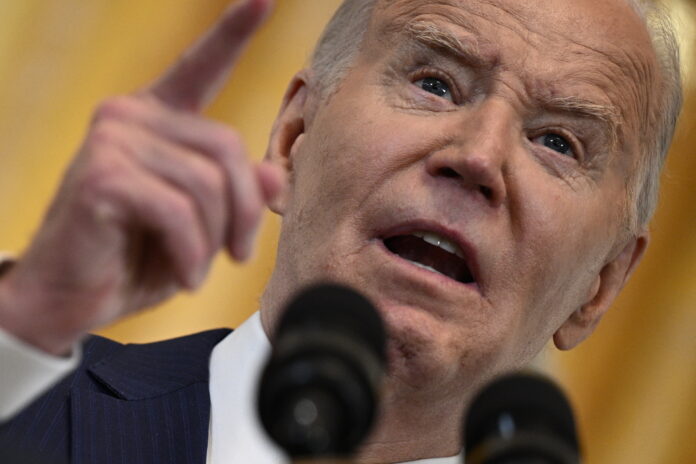Republicans are more concerned about President Joe Biden’s mental acuity than his immigration policies as it pertains to the 2024 election, according to a new poll.
Biden is on course to face off against Donald Trump in November in 2020 rematch. Last week, the incumbent and former president surpassed their required delegate thresholds to become their parties’ presumptive nominees.
Republican concerns over illegal immigration and border security have been at the forefront for months, stretching from local and state levels to questions about federal policies that have drastically shifted since Trump was president between 2017 and 2021.
Annual migrant encounters at the U.S.-Mexico border have increased each year under Biden, though the president and his Democratic colleagues have blamed Republicans for not passing any immigration-related legislation and instead campaigning on the issue for political gain.
BRENDAN SMIALOWSKI/AFP via Getty Images
Concerns among Republicans and Democrats vary in a new Deseret News/HarrisX poll published on Monday, with 45 percent of Republican respondents saying Biden’s mental acuity is their biggest concern heading into November—higher than the 38 percent more concerned about immigration policies. Their third-most important issue is the rising cost of living/inflation.
The poll asked voters, including independents, to rank their biggest concerns about Biden being hypothetically reelected in November. Biden’s age was the biggest concern among Democrats.
When the same question was posited about Trump should he win his second term, just 10 percent of surveyed voters named immigration policies as a concern—not enough concern to place the issue in the top 10.
Voters’ biggest concerns for another Trump presidency are his legal issues (24 percent), worsening division in the country (23 percent) and excessive use of executive power (22 percent).
Republican respondents said that Trump’s legal issues and more turmoil in the U.S. are major concerns, followed by another impeachment inquiry.
Independent voters are also most concerned about Biden’s acuity (36 percent), with immigration policies and cost of living (29 percent) tying for the second-biggest concern.
The online survey of 1,007 registered U.S. voters was conducted February 26 and 27. The margin of error is +/- 3.1 percentage points.
Brigham Tomco, a reporter for the Utah-based Deseret News who helped facilitate the survey, told Newsweek via phone on Monday that this was the first time that polling conducted in tandem with HarrisX asked voters the mental acuity question.
“It certainly is a surprise, but mental acuity does seem to be the dominant concern,” Tomco said. “In Utah, I don’t think it’s breaking news that we are reddest state least enthusiastic about Donald Trump.”
Louis Jacobson of the University of Virginia Center of Politics previously cited Utah as an interesting voting state because it is one of four Republican-voting states with the highest number of bachelor’s degrees but also a relatively urbanized area that doesn’t view Trump in the same manner as other GOP states.
Utah differs widely based on region, Tomco said. GOP delegates who operate by a caucus system and are much more tuned into the election cycle refer to border security/illegal immigration currently as the top issue, followed closely by election integrity and then other more evergreen issues like cost of living.
Democrats, meanwhile, in places like Salt Lake City are more prone to say they support their candidate, Biden, more so because they have a negative visceral reaction to Trump.
“I expect dissatisfaction of Trump as not being palatable to many Utah Republicans,” Tomco said. “Although he is a popular figure, it will reflect in a fewer total vote.”
Though Trump is projected to win the state, he could receive less support than in past years—notably if others like Robert F. Kennedy Jr. or a No Labels candidate make the ballot as a third-party option.
Uncommon Knowledge
Newsweek is committed to challenging conventional wisdom and finding connections in the search for common ground.
Newsweek is committed to challenging conventional wisdom and finding connections in the search for common ground.


